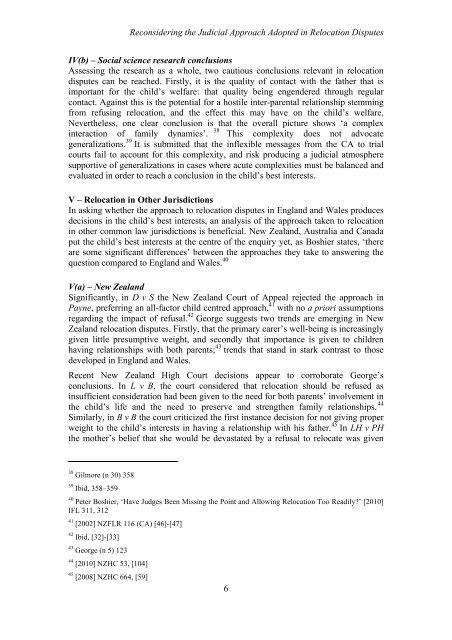Open UKLSR Volume 1(2) - Uklsa
Open UKLSR Volume 1(2) - Uklsa
Open UKLSR Volume 1(2) - Uklsa
Create successful ePaper yourself
Turn your PDF publications into a flip-book with our unique Google optimized e-Paper software.
Reconsidering the Judicial Approach Adopted in Relocation Disputes<br />
IV(b) – Social science research conclusions<br />
Assessing the research as a whole, two cautious conclusions relevant in relocation<br />
disputes can be reached. Firstly, it is the quality of contact with the father that is<br />
important for the child’s welfare: that quality being engendered through regular<br />
contact. Against this is the potential for a hostile inter-parental relationship stemming<br />
from refusing relocation, and the effect this may have on the child’s welfare.<br />
Nevertheless, one clear conclusion is that the overall picture shows ‘a complex<br />
interaction of family dynamics’. 38 This complexity does not advocate<br />
generalizations. 39 It is submitted that the inflexible messages from the CA to trial<br />
courts fail to account for this complexity, and risk producing a judicial atmosphere<br />
supportive of generalizations in cases where acute complexities must be balanced and<br />
evaluated in order to reach a conclusion in the child’s best interests.<br />
V – Relocation in Other Jurisdictions<br />
In asking whether the approach to relocation disputes in England and Wales produces<br />
decisions in the child’s best interests, an analysis of the approach taken to relocation<br />
in other common law jurisdictions is beneficial. New Zealand, Australia and Canada<br />
put the child’s best interests at the centre of the enquiry yet, as Boshier states, ‘there<br />
are some significant differences’ between the approaches they take to answering the<br />
question compared to England and Wales. 40<br />
V(a) – New Zealand<br />
Significantly, in D v S the New Zealand Court of Appeal rejected the approach in<br />
Payne, preferring an all-factor child centred approach, 41 with no a priori assumptions<br />
regarding the impact of refusal. 42 George suggests two trends are emerging in New<br />
Zealand relocation disputes. Firstly, that the primary carer’s well-being is increasingly<br />
given little presumptive weight, and secondly that importance is given to children<br />
having relationships with both parents; 43 trends that stand in stark contrast to those<br />
developed in England and Wales.<br />
Recent New Zealand High Court decisions appear to corroborate George’s<br />
conclusions. In L v B, the court considered that relocation should be refused as<br />
insufficient consideration had been given to the need for both parents’ involvement in<br />
the child’s life and the need to preserve and strengthen family relationships. 44<br />
Similarly, in B v B the court criticized the first instance decision for not giving proper<br />
weight to the child’s interests in having a relationship with his father. 45 In LH v PH<br />
the mother’s belief that she would be devastated by a refusal to relocate was given<br />
38 Gilmore (n 30) 358<br />
39 Ibid, 358–359<br />
40 Peter Boshier, ‘Have Judges Been Missing the Point and Allowing Relocation Too Readily?’ [2010]<br />
IFL 311, 312<br />
41 [2002] NZFLR 116 (CA) [46]-[47]<br />
42 Ibid, [32]-[33]<br />
43 George (n 5) 123<br />
44 [2010] NZHC 53, [104]<br />
45 [2008] NZHC 664, [59]<br />
6


